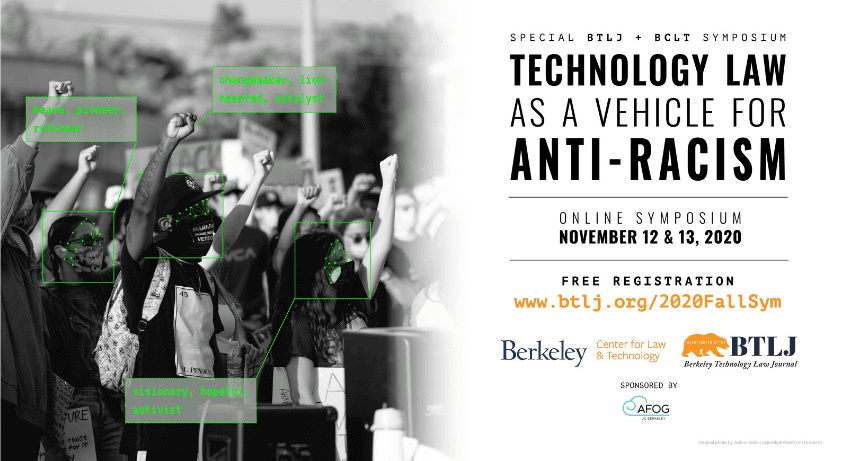
By Gwyneth K. Shaw
As the killings of Breonna Taylor, George Floyd, Jacob Blake, and others pushed the long-simmering national relationship with racial justice to a boil this summer, student leaders of the Berkeley Technology Law Journal saw an opportunity to advance the struggle to make technology an instrument for social change.
The result — “Technology Law as a Vehicle for Anti-Racism,” a free-two day virtual symposium on November 12 and 13 — aims to not just ignite a conversation about how to channel tech law and policy to serve the interests of racial justice, but to stoke the flames of action. Co-hosted by the Berkeley Center for Law & Technology and open to anyone, the event is particularly aimed at law students, practitioners, and academics.
The many ways tech-based tools can adversely impact Black people, Indigenous people, and people of color has become a hot topic, from concerns about the biases of pretrial algorithms to recent reports that the software used to administer remote Bar exams was unable to recognize a dark-skinned face. And yet discussions of these well-known problems rarely produce concrete action, organizers say.
“It’s either a conversation that’s not happening in a lot of places, or it’s stunted in a lot of places,” says Allan Holder ’21, one of the symposium’s leaders. “Given this time we’re in and what’s happened this year, it’s a great time to start talking about how technology, which has taken over so many aspects of our lives, intersects with very special considerations of race and how racial minorities are affected by new technologies in distinct ways.
“We definitely want to foreground this conversation, make it more prevalent, and incorporate it into mainstream conversations about how technology law impacts people.”
The symposium, which will be in a Zoom webinar format, came together at lightning speed over the past few months. And it’s attracted some big names, from the two keynote speakers — former Federal Communications Commissioner Mignon Clyburn and U.S. Rep. Ro Khanna of California — to many prominent academics.
The panels include discussions of algorithmic bias and its impact on people of color; net neutrality and other communications policies and their impact on minority populations; evidence, expert testimony, and race; and the possible conception of privacy as a civil right.
Action, not rhetoric
Harrison Geron ’21, another of the organizers, says the students wanted to host conversations that go beyond labeling the problems toward practical action.
“You read study after study — from 50 years ago, 20 years ago, 10 years ago, and today — about the impacts technology makes. But there aren’t many people, especially in the active practice of technology law, who are talking about what we actually need to do to push these institutions to really do something,” Geron says. “We wanted to center this on how you can do this in an anti-racist way: Here’s the foundation, this is what’s problematic and what we know about it, now this is what research says you can do.”
The student leaders chose to use the term “anti-racism,” because it “symbolizes action,” Holder says.
“It signals to people there are plans to be made, there are strategies to be enacted, there are things we can do to combat this problem we all know exists,” he says.
The organizers hope this symposium is the first of many, at Berkeley Law and other law schools. They also would like to see race and technology brought into law school curriculums, since today’s students are tomorrow’s practitioners.
“Many students in law schools across the country don’t get a lot of opportunities to examine the intersection of technology, law, and minority identities,” Holder says. “As a Black law student I certainly wish I had had more chances, and hopefully the symposium will help others who feel the same.”
Virtual perks
While the organizers, including Berkeley Technology Law Journal Editor-in-Chief Emma Lee ’21, would prefer an in-person event, going virtual has its advantages. They include boosting attendance from industry and academic heavy hitters who might not have been able to schedule travel to Berkeley.
“It’s a much different proposition to say, ‘Can you show up on Zoom?’” Geron says. “The access to very busy people who are doing amazing things in the world has been much easier than I thought it would be. A lot of that, I think, is due to our remote environment.”
Berkeley Center for Law & Technology Executive Director James Dempsey praises the students for seizing the moment.
“I am so proud of our students. They took their anger and anguish over police violence and systematic racism in America and channeled it into an examination of the positive ways in which law can promote a more just application of technology throughout our society,” he says. “That’s the finest form of lawyering in the Berkeley tradition: taking your passion for justice and applying it to produce objective analysis and concrete proposals for reform.”
Holder says the larger Berkeley Law environment galvanized the students to take on the symposium.
“This is a thing that could only have happened in this way at Berkeley Law, because of the student community we have, but also the space and support we have to put on things like this,” he says. “I’m super excited about it, and I’m so glad it’s happening here.”
Registration for “Technology Law as a Vehicle for Anti-Racism” is free. CLE credit is also available.